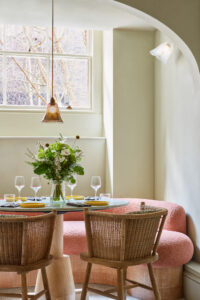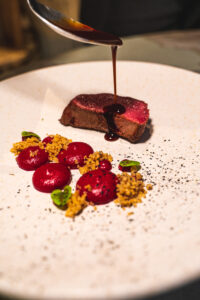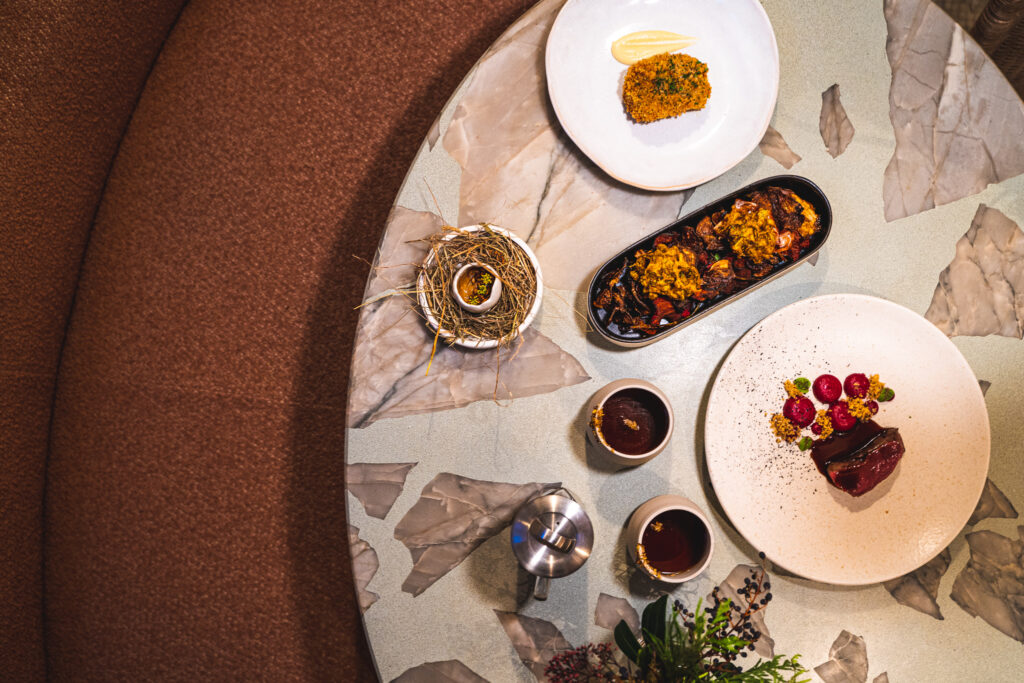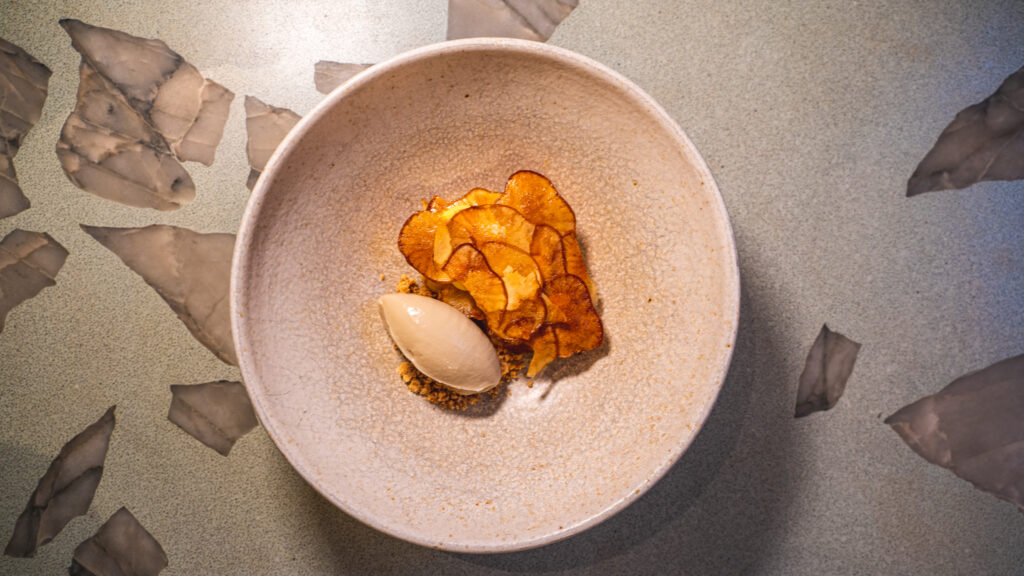Squirrel lasagna and extreme restauranting with Native’s Imogen Davis and Ivan Tisdall-Downes
Ivan Tisdall-Downes and Imogen Davis are now well-established restaurateurs on the London dining scene. Their journey to get there can only be described as a true display of entrepreneurial prowess, complete with tests of character and the constant need to adapt and reinvent themselves. From eating Quavers to serving squirrel to astonished diners, the duo tell us about the adventures that got them to where they are today, and how all the unpalatable experiences led to their incredible success.
Interview by Jeanne Kessira
It’s late 2022, the last pandemic-induced lockdowns feeling like a hazy memory everyone is desperately trying to forget. We find ourselves in the most mature form of Native thus far: as a collaboration with Browns department store in Mayfair. “We couldn’t have afforded to pay the rent here by ourselves,” Ivan explains, “not in a million years.” Imogen judiciously adds, “partnership is the future of retail and restaurants.”
But it took a long time and a resounding sense of fortitude to get to this full-fledged restaurant concept rooted in sustainability, creativity, and collaboration. The two friends met at university, both with markedly different upbringings, and absolutely zero plans to get into hospitality. Imogen’s childhood was spent foraging in the midlands at her parent’s organic farm shop where the provenance of food was deeply paramount; six mouths to feed meant you had to be resourceful, too. It wasn’t until she went to university that she realised there was such a difference in the way that people ate and sourced food.
Case in point, Ivan: South London born and bred, growing up on wagon wheels, quavers and pizza. For Ivan, meeting Imogen (and hearing stories of her pastoral upbringing) was the inspirational gateway into the world of foraging.

“It literally blew my mind and I was like, hang on, this is all on our doorstep. Why do I not know about this? It’s part of our heritage and culture and you’re not even taught about it at school.”
One summer break the two combined forces and started a foraged jam business selling on weekend markets in London, harnessing nature’s available bounty and paving the way for recipe testing and experiments that would come to define their culinary identity. “It gave us a platform, a low barrier to entry for trialling our food. And we developed a kind of nose-to-tail, root-to-fruit system, implementing how Imogen grew up,” explains Ivan.
There were financial tests, tests of principles, and tests of nature. “We have to be content with what we’re putting out there, knowing we’ve done the best we possibly can. It makes us get creative; and if it’s not available, we don’t have it.” An incredibly innovative set of dishes, inspired resourcefulness, and a drive to upend the opaqueness of the industrial food complexes of today were born out of that odyssey.
“It wasn’t a gimmick, just a natural progression of serving sustainable food”
Foraged ingredients were all well and good, but the pair figured they could be even more sustainable – and daring – with their choice of ingredients. The Wood Pigeon kebab, a playful take on London’s favourite late night snack which they sold on Fenchurch Street Market to suited-up men and women c. 2015, was their first foray. It won the duo a Timeout ‘Dish of the Week’ award, acclaim which only fueled their audacious moxie.
But “Native” and the word “audacity” couldn’t be uttered in the same breath without mention of the Squirrel Lasagna.
They came up with the idea in 2018, at their second bricks-and-mortar restaurant in London Bridge. “It wasn’t a gimmick, just a natural progression of serving sustainable food,” Ivan maintains, with a candour reserved for the sincere. Providing a culinary market meant the animal could be culled in a humane way and saved the meat from waste; and besides, Native weren’t the first to do it. Squirrel had graced menus from the likes of The River Cottage and St. JOHN, but when Native’s rendition hit the media, it suddenly went viral.
The fame was, naturally, accompanied by vicious online trolling. Photos appeared across social media with slanderous comments: “People were sharing pictures of me online, saying, look at this disgusting woman, I know that she personally catches the squirrels and puts them in a bag and bludgeons them to death…our google rating went down to 2.8. It was really, really horrible”. The biggest irony of all was that the majority of the criticism came from people abroad who had never stepped foot inside Native.

One could say that every cloud has a silver lining, or better yet that there’s no such thing as bad publicity. Off the back of the ordeal, Ivan was invited to go on Great British Menu and Native’s position in the industry as a stand-your-ground sustainable business was only fortified. In fact, if you walk into Native x Browns today you might want to take a look down – a colourful squirrel mosaic graces the floor, the duo’s playful nod to the entire affair.
The first pandemic lockdown hit the industry hard, and like so many others, Native briefly turned to e-commerce before fully shutting down. By July 2020, the call to return sounded and they found themselves enlisted to run a restaurant on the private island of Osea. With free rein to set up a full tasting menu utilising all the wild products offered by the island, it was a dream – almost. Movement to and from the island also happened to be dictated by the tides.
“We had these spreadsheets of tide tables and were working out when we’d get people onto the island for four o’clock. They’d have an hour to tour the island, followed by a 15-course tasting menu, then we had to drive them off to the other side before the tide came back in again.”
Ivan reckons it may have been the best restaurant in the UK for about 16 days. Yet the pair always knew that this particular iteration of Native could only exist as a temporary pop-up. There were so many power outages that they had to get a generator, and every delivery was incredibly hurried as drivers would have no choice but to chuck everything out the lorries then speed off again to avoid the coming tide. It was ultimately a test in “extreme restauranting” Imogen recalls, “a badge of honour for 2020”.

“You think you’re just this tiny little island going through it on your own. But everyone’s going through the same thing.”
The plan for the Browns x Native collab came shortly after, and not a moment too soon. “It’s taken years for us to find our feet and work out where we are. We’re finally happy and it feels like proper Native again.” And yet, these words are not spoken with regret nor exasperation, but rather tinged with relief and an unspoken acknowledgement that all those tests brought them the successes they now reap.
They reflect back on how different the pop-up landscape was in 2015, when they first began. “It was rogue. We’d sit on Google Maps, look at cafés and just email them. It was relatively risk-free and such a good way of getting your name out there and learning the ropes, but it wasn’t such a slick operation as it is now.” And they certainly didn’t go into restauranting with buckets of knowledge; in fact, they didn’t know a thing about turning tables when they opened their first ever restaurant in Neal’s Yard. Nor did they have a network of people to lean on for advice and assistance. They built their credibility and assuredness over time, and now people come to them asking to host pop-ups at their place. “You think you’re just this tiny little island going through it on your own. But everyone’s going through the same thing.” Even an IP dispute with McDonald’s over Native’s take on the Filet-o-Fish® couldn’t get them down. In previous years they would have panicked, now they celebrate with a high five.
It feels trite to say that all those trials and tribulations led Ivan and Imogen to where they, and Native, are today. Equally, it could not be more true. “It’s what hospitality is, isn’t it? It’s just like a snowball. That’s why we love it.”

